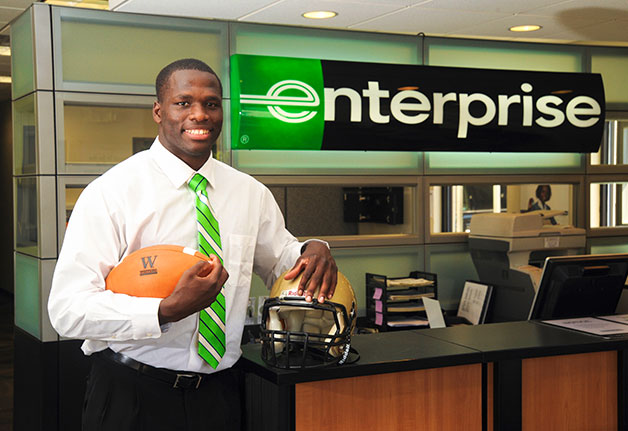On the first day of his first job after graduating from Wofford, Corry Oakes '89 boarded a plane at 6 a.m. and didn't finish working until midnight.
The discipline, mental toughness and work ethic he learned as a student-athlete on the college’s football team, prepared him for that day and the many other grueling days that followed as he moved up the corporate ladder with Extended Stay America, then, along with two partners, established OTO Development, a hotel development and property management firm.
“Understanding what it means to compete is one of the most important traits you can have in business,” says Oakes. “Every day someone is trying to take a share of your business, and you have to work awfully hard to keep it.”
According to Oakes, the majority of the OTO leadership team played high school or college athletics. A coincidence? No.
According to Oakes, some traits that make student-athletes great employees include: time management, discipline, the ability to multitask, teamwork, optimism and perseverance. “Perseverance in life is a critical skill that we don’t always teach as parents or in schools,” says Oakes. “In athletics you can’t help but learn it.”
Kelley Stovall, chief recruitment officer for Northwestern Mutual in Greenville, S.C., agrees.
“More than 90 percent of our current team has athletic experience,” says Stovall. “The discipline that they have mastered on the playing field or court translates well to working in financial services.”
Stovall says that student-athletes are coachable. That’s one reason that Northwestern hires them as interns as often as possible. Because they value the traits that student-athletes bring to the job, they are even willing to work around their practice, lab and classroom schedules to make internships doable for student-athletes with busy schedules.
“We’ve known for a long time that student-athletes make the best interns and employees, but Northwestern formalized a program with the NCAA about three years ago to specifically recruit and train them,” she says. “The reality is that very few student-athletes will go pro after college. We want them to know that there’s life after athletics, and Northwestern is a good fit.”
Enterprise, through its partnership with Career Athletes and the NCAA, is another company that recruits student-athletes for careers right out of college.
“Our commitment to college recruitment has made us the number one recruiter of college graduates and many former student-athletes have realized their potential and developed successful careers with us,” says Marie Artim, vice president of talent acquisition for Enterprise. “We see the skills that student-athletes gain from their experience and know the value they can bring to our business.”
Mike McCrimon ’14, a former linebacker for the Terriers, was watching the NCAA basketball tournament in March and saw the Enterprise commercials targeted toward student-athletes. He applied online for a job and a month later was hired.
“Working for Enterprise is a lot like playing football,” says McCrimon. “On the Wofford football team, I had individual goals, but those had to contribute to making our team the best it could be. It’s like that at Enterprise, too. At the end of the day, you want to help your branch be the best branch in the group.”
McCrimon says that they work long hours at Enterprise and must be prepared to communicate effectively with customers. He feels that his experience as a Wofford student-athlete prepared him for that type of work environment.
“I definitely enjoy working with Enterprise,” says McCrimon. “There’s something different every day — like in athletics — you can’t go through the motions. It’s competitive. They throw you in the fire and tell you to have at it. I went from a competitive sport to a competitive career, and I love it.”
Brent Williamson, Wofford’s associate athletics director for sports information, says hiring student-athletes is a hot topic right now with CoSIDA, College Sports Information Directors of America, running an article online in August, “Why Your Next Employee Should Be A Former Student-Athlete.” The article says that student-athletes are: achievement oriented, resilient, strong communicators, team oriented and effective time managers.
None of this surprises Oakes.
“We talk about these traits every day in our business,” he says. “All work is honorable, and when you work with a team, there are so many opportunities to feel like you’re part of something bigger than yourself. In our business the general manager and the director of sales get the major attention, but if the housekeeper drops the ball, we’re dead. Everyone has an important role to play on a team, and student-athletes understand that.”
By Jo Ann Mitchell Brasington ’89
